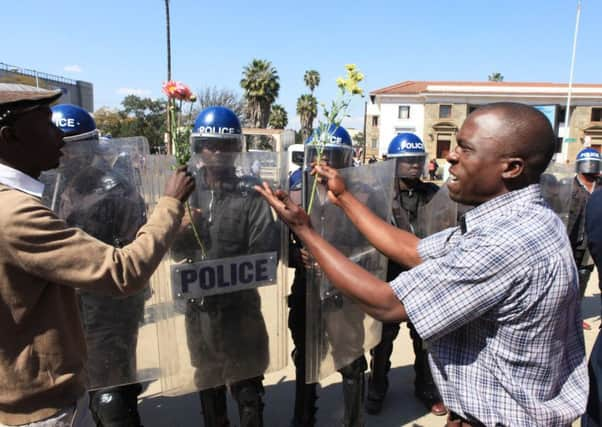Zimbabwe police fire tear gas and water cannons at protesters


Anti-government protests have become common in this troubled southern African country amid frustrations over a rapidly deteriorating economy.
Hundreds of people hurried for cover yesterday as baton-wielding police moved in to disperse activists who were marching to the country’s reserve bank in Harare to protest a currency crisis.
Advertisement
Hide AdAdvertisement
Hide AdZimbabwe abandoned its currency in 2009 following hyperinflation, adopting a multi-currency system dominated by the United States dollar.
President Robert Mugabe’s government has now begun printing its own bank notes again.
The new notes, called “bond notes”, are being introduced to remedy a shortage of US dollars that has seen the resurgence of bank queues and empty ATMs.
Zimbabwe’s central bank chief John Mangudya says the notes will “go a long way in increasing economic confidence within the economy”.
But with memories of the reckless printing of “bearer cheques” during the 2000-8 economic crisis that led to hyperinflation reaching an estimated 500 billion per cent, hardly anyone believes him.
Spokesman Obert Gutu of the Movement for Democratic Change (MDC) party said on Twitter that the ruling Zanu-PF was now “broke beyond repair”.
The Zimbabwe People’s First party, which is headed by the ousted vice president Joice Mujuru, said Mugabe’s government had “run out of ideas to fix the regressing economy”.Cash shortages have peaked in Zimbabwe in the last three weeks, leading to lengthy queues and empty ATMs. Bank withdrawals have been limited to $60.
Plastic money is used very little in the country, where around 70 per cent of the population lives in rural areas.
Advertisement
Hide AdAdvertisement
Hide AdLocals spoke of trying to empty their bank accounts by offering $20 US “payments” to bank clerks.
Traders are already selling cash at a 10 per cent commission, reports say.Trevor Ncube, the publisher of the Newsday paper, summarised the prevailing sense of panic when he tweeted: “Run on banks. Black market. Not nice at all.”
There were grim forecasts of a fresh flight of Zimbabweans across the border to South Africa, as happened during the 2000-8 economic crisis.
Around two million Zimbabweans already live and work there.
Zimbabwean writer @tumaloons said: “It breaks my heart that I might have to go back to SA. I love it so much here but how do you run an economy with funny money?”
President Robert Mugabe has responded to the recent protests by saying that people who are unhappy with living conditions can leave the country. The 92-year-old has been in power since 1980.
Frustrations over rapidly deteriorating economic conditions in Zimbabwe, compounded by dissatisfaction over alleged government corruption and incompetence, have resulted in near-daily protests in recent weeks.
Last week, protesters burned a warehouse at Beitbridge, a busy border post between Zimbabwe and South Africa, over a Zimbabwean decision to ban a wide range of imports.
Seventeen people appeared in court on Sunday over the Beitbridge protests and were charged with public violence.
Separately, state hospital doctors and other government workers said they will strike over the government’s failure to pay their June salaries on time.